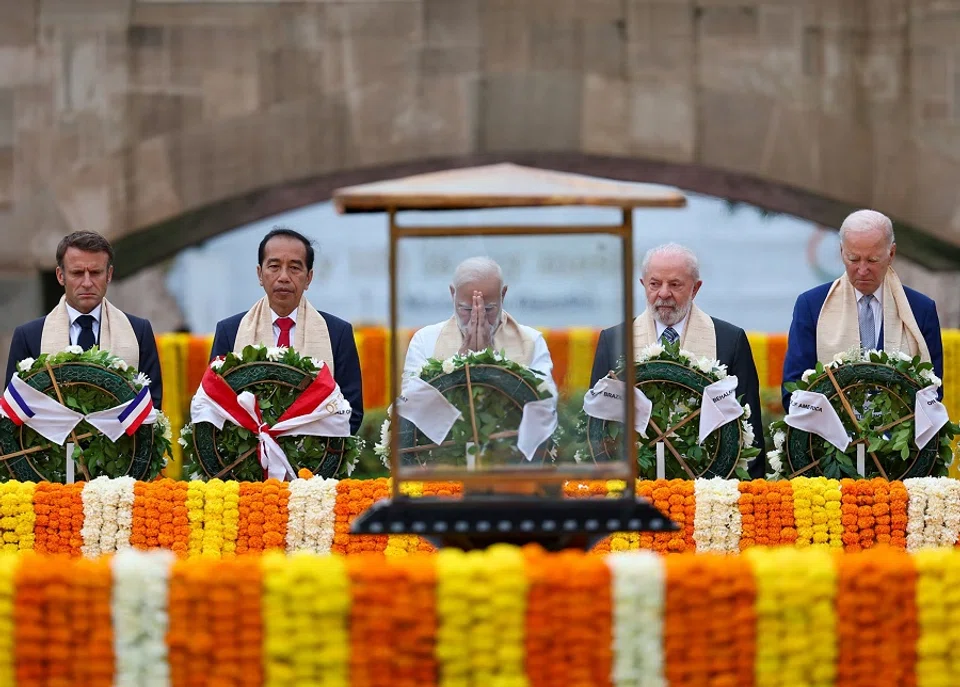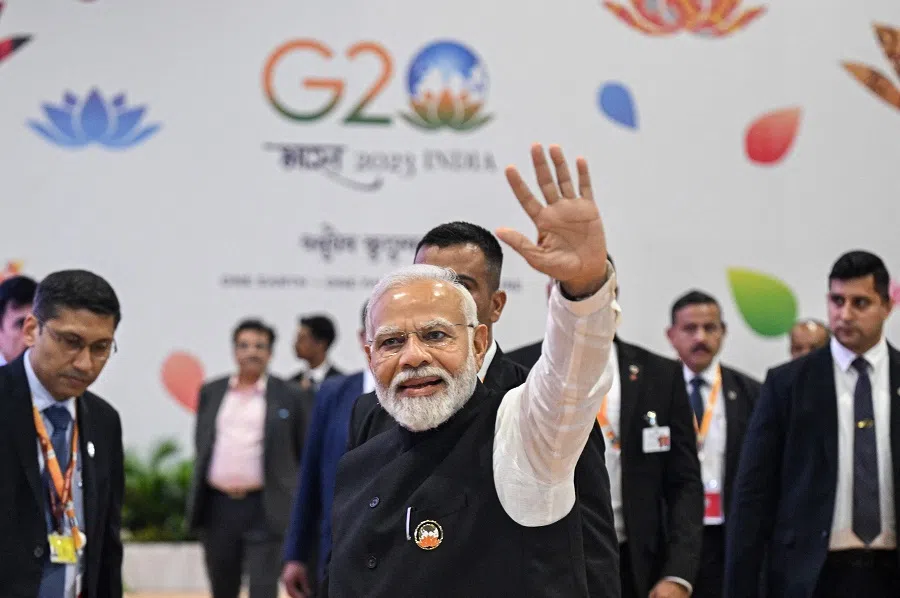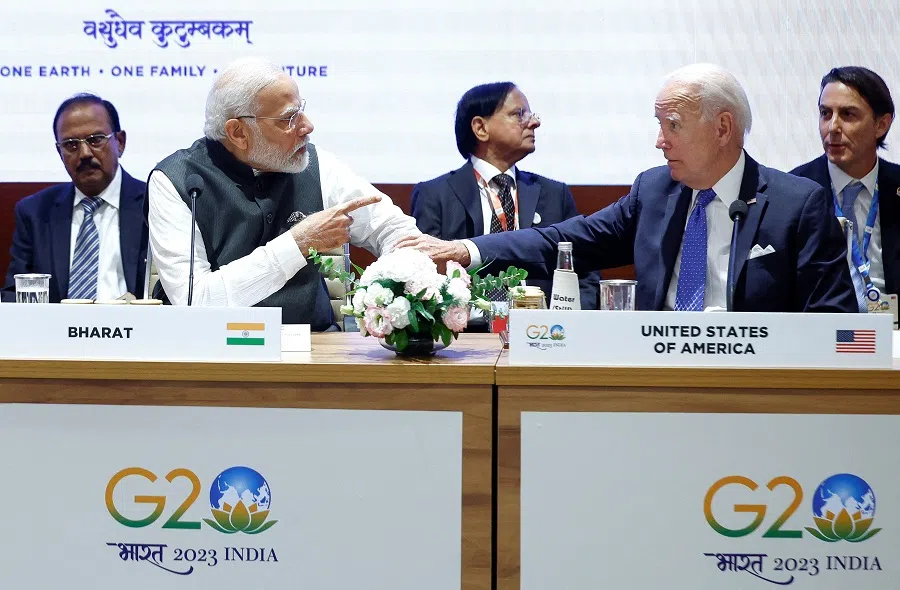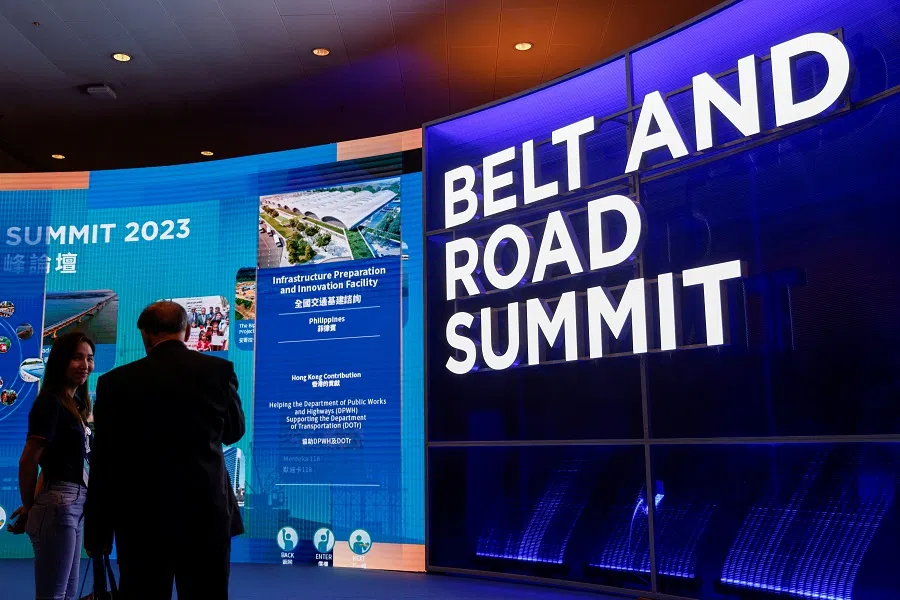China and India are not playing a zero-sum game in the global south
With the announcement of the India-Middle East-Europe Economic Corridor at the recent G20 summit, it could be easy to assume that India has made its strategic decision to join the US-led West to counter China, or that the IMEC is a natural rival to China's Belt and Road Initiative. But complementary multilateral structures may not be a thing of the past.

By all indications, this year's G20 summit held in New Delhi is a success. India exerted much influence in shaping the agenda and outcome of the summit, including welcoming the African Union (AU) into the group and releasing a joint declaration that focuses on common interests but avoids controversial issues such as condemning Russia for its invasion of Ukraine.
In the absence of Chinese leader Xi Jinping and Russian President Vladimir Putin, Indian Prime Minister Narendra Modi snatched global attention and became a media darling. Over a week after the summit, the outpouring of largely positive comments on Modi's performance has not stopped. In the views of some, India has been exalted into the leadership position in the global south, rivalling or perhaps overtaking China.
The real significance of the G20 summit lies in its embrace of a multipolar world today...
Some analysts even go further by suggesting that India has proved itself to be a reliable partner for the US in pushing back China. As one commentator asserts: the US-led order survives with India as a "trustworthy fulcrum".
Overblown rhetoric
There is no doubt that the 2023 G20 summit was a great moment of India's multidirectional diplomacy and Modi's strong leadership. However, much of the rhetoric about the summit seems overblown and off target. And many claims about India's relations vis-à-vis China and the US seem to be based on a questionable assumption that India has joined the US in countering China.
The real significance of the G20 summit lies in its embrace of a multipolar world today, with the US, China, India, the European Union (EU), AU, and the Association of Southeast Asian Nations (ASEAN) all playing active roles in the new global politics and economics.

The 2023 BRICS summit held weeks earlier in South Africa and its expansion to include more developing countries are also evidence that the world has become more diverse and the global south is a major force in world affairs today.
Putin missed both meetings probably due to an International Criminal Court arrest warrant. The Russia-Ukraine war has dragged on longer than many have expected. North Korean leader Kim Jong-un's recent meeting with Putin in Russia and expected military cooperation between the two countries will only add complexity to Eurasian security. Russia is not a major economic power today but remains a key geostrategic player in global affairs today.
Xi attended the BRICS summit but skipped the G20 gathering and sent Premier Li Qiang instead. International media were busy speculating on why Xi did not travel to India while downplaying Premier Li's presence and his friendly exchanges with several world leaders on the sidelines of the G20 summit including with Prime Minister Modi and President Joe Biden. The Chinese foreign ministry praised the G20 joint declaration for sending "a positive signal" for global cooperation.
An economic corridor to rival the Belt and Road?
Notably, a memorandum of understanding (MOU) was unveiled during the G20 summit by the governments of India, the US, the UAE, Saudi Arabia, France, Germany, Italy, and the EU to form the India-Middle East-Europe Economic Corridor (IMEC). According to the White House, this landmark project is expected to stimulate economic development through enhanced connectivity and economic integration across two continents, thus unlocking sustainable and inclusive economic growth.
...it is premature, even wrong, to declare that India has made its strategic decision to join the US-led West to counter China and to become the leader of the global south.

The IMEC was launched as China celebrates the tenth anniversary of the Belt and Road Initiative (BRI) this year. It is easy to view the IMEC as a foil to the BRI, but it is unclear how the ambitious project will be implemented and where the funding will come from. Furthermore, some IMEC signatories are also part of BRI, including Italy, Saudi Arabia and the UAE. Even if Italy leaves the BRI in the future, it will continue to maintain strong economic ties with China.
While some may consider the IMEC as a counterforce for the BRI, it should be pointed out that the BRI and IMEC feature some of the same key words such as "connectivity", "integration" and "development". This suggests that the two initiatives share common goals, and major countries involved, especially China and India, can play leadership roles in promoting global development together. As its economy faces some headwinds, China may cut down its investment in some of the BRI projects, so the IMEC could serve as a complement, especially for developing countries involved.
India, the most populated nation now, is a rising power interested in playing some leadership roles in an emerging multipolar international system. However, it is premature, even wrong, to declare that India has made its strategic decision to join the US-led West to counter China and to become the leader of the global south. It is a misreading of the global reality in which major powers do work together to achieve common global goals such as climate change, public health and human security despite their differences.
China and India are not engaged in a zero-sum rivalry in the global south.
Not a zero-sum game
"There is a structural shift happening in the global order," said Kishore Mahbubani, a veteran Singaporean diplomat, in a recent New York Times article. "The power of the West is declining, and the weight and power of the global south - the world outside the West - is increasing." He added that only one country - India - could be the bridge between "the West and the rest".

However, this does not mean that China will lose its strong position in the developing world. As Ziyanda Stuurman, a senior analyst with the Eurasia Group's Africa Team, said, "Whether it's India or the US or Europe, if they are not able to match or be as serious as China with rolling out funding, China will still enjoy this place of leadership." Building on decades of a policy of valuing relations with developing countries including India, China is likely to maintain its support for the global south despite its many domestic challenges. Most importantly, China and India are not engaged in a zero-sum rivalry in the global south.
The US-China equation
The US role in actively promoting the IMEC while being critical of the BRI speaks volumes of how the US government views India and China today. It is also noteworthy that President Biden skipped the closing session of the G20 summit and travelled to Vietnam before heading back, a move widely interpreted as part of the Biden administration's effort to rally support from allies and partners to encircle China.
However, Vietnam, like most other third parties caught in the US-China rivalry, is noncommittal in joining Washington to counter Beijing. Rather than choosing between the US and China, Hanoi is reinforcing its omnidirectional foreign policy in which it strives to keep equidistant from both.
Competition is inevitable, but cooperation is a must in US-China relations. The US side has kept the momentum to ease tensions in the relationship, as evidenced by the latest strategic dialogue between national security adviser Jake Sullivan and Chinese Foreign Minister Wang Yi. Encouraged by a recent string of Cabinet-level visits to China by Biden administration officials, members of US Congress are finally making the move to plan trips to China after a hiatus of more than four years.
As the world clearly moves towards multipolarity, it is unhelpful to continue to view the world purely from the realist perspective of power-grabbing and rivalry.
Senate Majority Leader Charles E. Schumer (Democrat-New York) and Senator Mike Crapo (Republican-Idaho) hope to lead a bipartisan visit in October. Representative Ro Khanna (Democrat-California) indicated he would organise a trip to China by fellow members in the House of Representatives. The last congressional trip to China took place in August 2019, when a group headed by Representative Dina Titus (Democrat-Nevada) was there to mark the 40th anniversary of diplomatic relations. One hopes that the resumption of congressional visits to China will help stabilise relations between the two countries.
There are two major theoretical perspectives in international relations: realism that emphasises competition for power and liberalism that highlights cooperation for mutual benefits. The US remains the most powerful in today's world, but other countries are quickly catching up, narrowing the power gap. As the world clearly moves towards multipolarity, it is unhelpful to continue to view the world purely from the realist perspective of power-grabbing and rivalry. A clear message from recent developments in global affairs is that it behooves major powers, particularly the US and China, to work together in a multipolar world.





